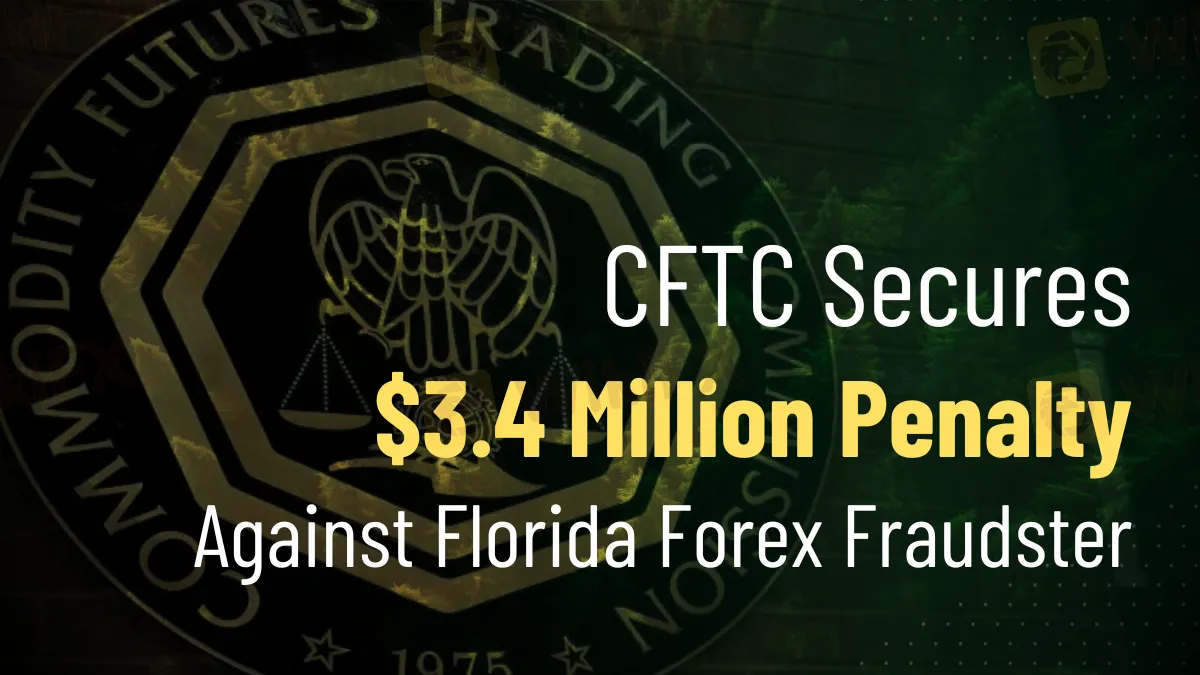简体中文
繁體中文
English
Pусский
日本語
ภาษาไทย
Tiếng Việt
Bahasa Indonesia
Español
हिन्दी
Filippiiniläinen
Français
Deutsch
Português
Türkçe
한국어
العربية
CFTC Secures $3.4 Million Penalty Against Florida Forex Fraudster
Abstract:Florida Forex trader Joseph Carvajales fined $3.4M for fraud, barred from trading, in CFTC case over illicit futures & forex scheme.

The U.S. District Court for the Southern District of Florida has ordered Joseph Carvajales, a Florida Forex trader, to pay $3.4 million in fines and damages for his involvement in a fraudulent scheme involving futures, forex, and options trading. The U.S. Commodity Futures Trading Commission (CFTC) started the legal proceedings on February 7, 2022, and they ended with this decision, which became official on March 20 by a consent order.
Carvajales' misconduct also makes him subject to a $1 million civil monetary penalty and a court-mandated $2.4 million restitution order to the customers he deceived. Moreover, the ruling prevents Carvajales from engaging in any trading or registration activity forever, and it also imposes a perpetual injunction that forbids any future breaches of the Commodity Exchange Act (CEA) and CFTC rules.

The findings against Carvajales demonstrate that his employment at The W Group (WTG) was the subject of numerous dishonest activities. He misled current and prospective WTG clients about the nature of their investments between June 2013 and June 2020. Carvajales was misled about WTG's trading practices when he claimed the firm used proprietary commodities trading algorithms and handled customer money in profit-generating trading accounts.
Investigating these claims, however, revealed that neither individual trading accounts nor customer money were ever formed, much less deposited or used for trading as stated.
This lawsuit is an outgrowth of the one filed against WTG and co-defendant Larry Ramos Mendoza of Miami, Florida. A previous verdict by the court stated that WTG and Ramos had unlawfully seized the funds of at least 220 consumers. They distributed phony account statements to customers that supposedly indicated positive trading activity, which amounted to fraudulent solicitation. As a result, WTG and Ramos were hit with a hefty $22,448,040 civil monetary penalty and ordered to pay a total of $7,482,680 in restitution. Similarly to Carvajales, they were ordered to refrain from violating the CEA and CFTC statutes at all times and were additionally subject to permanent registration and trading limitations.
Carvajales, WTG, and Ramos are the targets of enforcement actions that highlight the CFTC's continued commitment to maintaining the integrity of the American financial markets and protecting investors from dishonest business practices and illicit activities. The CFTC seeks to create a consistent, open, and honest trading environment for all market participants by enforcing severe fines and prohibitions that will discourage such behavior in the future.

Disclaimer:
The views in this article only represent the author's personal views, and do not constitute investment advice on this platform. This platform does not guarantee the accuracy, completeness and timeliness of the information in the article, and will not be liable for any loss caused by the use of or reliance on the information in the article.
Read more

Oleg Mukhanov Steps Down as TradingView CEO Amid Leadership Shakeup
In a surprising announcement on Thursday, Oleg Mukhanov, who has been at the forefront of TradingView’s growth over the past few years, revealed his decision to step down as CEO. Mukhanov, who ascended to the role in January 2024 after joining the technology giant in mid-2022 as Group Chief Financial Officer, will continue to serve as an advisor to TradingView’s board.

Forex Trading: Scam or Real Opportunity?
Meta: Explore forex trading: Is it a scam or real opportunity? Learn how it works, debunk myths, manage risks, and avoid scams with tools like WikiFX App. Start trading safely today!

Donald Trump’s Pro-Crypto Push Boosts PH Markets
Donald Trump’s pro-crypto stance lifts PH markets with a strategic reserve of Bitcoin, Ether, XRP, Solana, and Cardano, driving a 10% surge in crypto value.

Is Linkbex a Scam? SFC Warns of Virtual Asset Fraud in Hong Kong
Hong Kong SFC warns against Linkbex for virtual asset fraud. Learn about false claims, locked accounts, and how to stay safe from investment scams.
WikiFX Broker
Latest News
Forex Trading: Scam or Real Opportunity?
The Hidden Tactics Brokers Use to Block Your Withdrawals
Deutsche Bank Facing Record Fine from German Watchdog – What’s the Price
Oleg Mukhanov Steps Down as TradingView CEO Amid Leadership Shakeup
Currency Calculator






